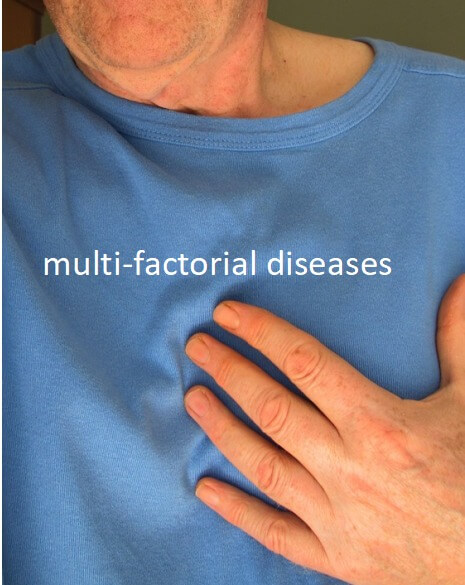Role of digital health in multi-factorial diseases
What are multi-factorial diseases?
Multi-factorial diseases such as myocardial infarction, cancer, Type 2 diabetes or Alzheimer’s disease have polygenic inheritance. These diseases ‘accumulate’ in families, and occur in the relatives of patients more often than in the general population. At the same time, their inheritance usually does not correspond to any of Mendel’s law on the inheritance of monogenic diseases. Monogenic diseases are diseases in which the aetiology is based on a single gene mutation which can be inherited from one of a parent or both. Currently, about 5,000 types of monogenic disorders are described with examples of Phenylketonuria or Beta Thalassemia.
It is believed that multi-factorial diseases are caused by a complex interaction of many genetic and environmental factors, so they are referred complex type of inheritance.
Environmental causes that can initiate, accelerate, enhance or protect against disease. A significant number of Native Hawaiians have serious health problems related to Western diet. Native Hawaiians and Pacific Islanders are more than three times more likely to be diagnosed with diabetes, compared to non-Hispanic whites. In the mountain population of Sardinia has aroused considerable interest in its traditional food and the special diet as one of the potential causal factors of exceptional male longevity.
Alzheimer’s disease is the multi-factorial disease is the most common form of dementia and may contribute to 60–70% of cases. Worldwide, around 50 million people have dementia, with nearly 60% living in low- and middle-income countries. Every year, there are nearly 10 million new cases according to World Health Organization (WHO). Cardiovascular Disease (CVD) a leading economic burden, and 17.7 million people die each year from CVD, an estimated 31% of all deaths worldwide (WHO).
| Recommended for you | |
| Big Data in medicine | |
| 4 Key market segments of genomics in digital health industry | |
| Google’s deep learning tool for genome sequencing goes open source |
Can digital health technologies provide deeper insights into multi-factorial diseases?
Wearable make digital health technologies (DHT) pervasive by incorporating it into daily life and help patient or user builds confidence and trust in the technology. Most DHT such as Pulse oximetry and others are generating vast amounts of data from patients, health providers and other sources, including electronic medical records. There are ongoing interests of biotech and pharmaceutical companies in the analysis of patients Big Data by Artificial Intelligence (AI) software.
The most promising and challenging aspect of AI methods in DHT is early diagnosis and risk assessments for development multi-factorial diseases such as CAD or diabetes.
AI and Machine Learning are umbrella terms for a set of algorithms, which allow software to uncover patterns and make decisions from analysis of patients’ genomics and physiological data. It is a continuous work being led by multiple players to find actionable genomics variants and to correct algorithm mistakes (training) which adds to AI predictive model confidence and increase predictability. There is some progress has been done regarding incorporating a genetic risk score into CAD risk assessments which estimates: genetics effect on low-density lipoprotein cholesterol levels.[1]
Recent progress in diabetes management, announces an individualized wearable for glucose management from DexCom, Inc. to help people with Type 2 diabetes manage their condition in real time.
This wearable consists of a sensor and a transmitter which sends the data to a smartphone, which processes and displays updated data every five minutes, and can reveal relationships between eating, exercise and blood sugar. The AI-based software is increasingly being applied in cardiology to interpret complex data ranging from advanced imaging technologies like echocardiography. Other software has been developed for CT, MRI, single-photon emission CT, near-infrared spectroscopy, optical coherence tomography allow for fast analysis and visual assessment of structural changes.[2]
Google recently announced a software for analysing of pictures from patient’s retina which can predict with 70% accuracy a heart disease or other major cardiovascular events during next 5 years.
Major players in the field of big data and multi-factorial diseases
Eric Topol, MD is Professor of Genomics at The Scripps Research Institute (TSRI), and the Founder and Director of the Scripps Translational Science Institute (STSI),. He spent many years of his career trying to identify major determinants in the genetics of CAD. He was given by US National Institutes of Health a record $120 million to help medicine make a historic shift to treating patients with CAD based on their specific genetic makeup, lifestyle, and environment.
James S. Floyd and Bruce M. Psaty from The University of Washington study the potential use of genomics to the prediction, prevention, and treatment of diabetes.
They point out that a primary barrier to the application of genomics in diabetes care, particularly for type 2 diabetes, is the lack of actionable genomics findings.
Global Genomics Group _G3 is trying to combine efforts to develop life-changing diagnostics and therapeutics for CAD by using GNS’s Causal Machine Learning software. In February 2018 G3 and Datavant announced the formation of a strategic partnership to improve the design and interpretation of clinical trials.
iCarbonX is a company founded by Chinese genomicist Jun Wang, former CEO of Beijing Genomic Institute (BGI), in 2015. iCarbonX combines genomics with other health factors such as metabolites, bacteria and lifestyle choices to create a digitalized form of life. A British tech unicorn BenevolentAI is trying to cure Alzheimer’s and ALS with artificial intelligence. BenevolentAI uses AI to mine and analyze vast amounts already-published biomedical information, from clinical trials data to academic papers.
HeartFlow is another exciting, revolutionary, medical software startup that has received international recognition for exceptional strides in healthcare innovation with revenue of 10 Million.
The company changing cardiovascular healthcare through improvements in the accuracy of non-invasive tests for Coronary Artery Disease, the most common form of Heart Disease and the number one killer of men and women in the world.
Regeneron Pharmaceutical and Regeneron Genetics Center (RGC) have built one of the world’s most comprehensive genetics databases, pairing the sequenced exomes and de-identified electronic health records of more than 180,000 people. Regeneron explorations include Mendelian and family frameworks, large-scale population genetics (both common and rare variants) and gene-gene interactions to create drugs to treat CAD and other life-treated diseases.
Bayer 150-year-old global life sciences company is changing with the initiative of Digital Health by using new wearable technologies sensors, machine learning technologies, artificial intelligence technologies, that will be used in all business area.
Conclusion
Multi-factorial disease development highly depends on the interaction with environmental factors such as a diet, lifestyle or stress. Digital Health can offer real-time feedback by tracking patient’s vital signs but also can be a powerful tool for physicians or healthcare providers for prevention and prophylactic actions.
Future success of converging digital health with patient genomics data is a subject of active competition for novel AI and Machine Learning methods.
In the process of creating algorithms, it is important to take into account both the correct mathematical models and the importance of using biological or genetic extended knowledge to make them maximally accurate and predictive.
A joint venture of government structures and pharmaceutical business to create start-ups ecosystems and support their mobility to bring the invocation to all business areas is also highly desired.
Image credit: www.istockphoto.com

















